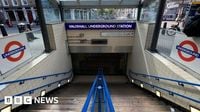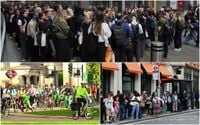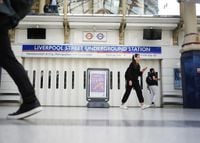Londoners awoke on Wednesday, September 10, 2025, to yet another day of disrupted commutes, shuttered stations, and mounting frustration as a week-long strike by London Underground workers entered its fourth day. The industrial action, spearheaded by thousands of members of the Rail, Maritime and Transport (RMT) union, has paralyzed much of the city’s iconic Tube network, leaving millions scrambling for alternative ways to get around and prompting renewed calls for resolution from political leaders and weary commuters alike.
The dispute centers on two core demands from the union: a pay increase and a reduction in working hours. According to BBC, RMT members are seeking a gradual move from a 35-hour to a 32-hour workweek, citing concerns over fatigue and extreme shift patterns. While Transport for London (TfL) has offered a 3.4% pay rise, it insists that a shorter workweek is simply unaffordable, estimating the change would cost the network around £200 million per year. “A reduction in the contractual 35-hour working week is neither practical nor affordable,” said Claire Mann, TfL’s chief operating officer, echoing the agency’s stance that the demand is out of reach for now.
But for the thousands of Tube workers walking picket lines across the capital, the issue goes beyond pay. “We take no pleasure in causing disruption but we make no apology for fighting for our members,” RMT General Secretary Eddie Dempsey told delegates at the TUC Congress in Brighton, as quoted by the Evening Standard. Dempsey called on London Mayor Sadiq Khan to personally intervene, arguing that there “has been a total collapse of industrial relations on London Underground.” He added, “Stop going on social media, invite us to the meeting, let’s have a discussion, because I want to know what is going on in London.”
As the days ticked by without resolution, the city has felt the impact acutely. According to Virgin Media O2 data reported by BBC and the Evening Standard, footfall across central London at 1 p.m. on Tuesday was down 16% compared to the previous week. The drop was even more dramatic in business districts heavily reliant on the Tube and Docklands Light Railway: Canary Wharf saw a 31% decrease, London Bridge and the City were down 21%, and Westminster 19%. A spokesperson for Virgin Media O2 summed it up: “As Tube strikes continue across London, mobile network data analysis shows a significant drop in footfall across key business districts including Canary Wharf, the City and Westminster.”
The economic consequences are stacking up. The Tube typically handles more than four million trips on a weekday, and the Center for Economics and Business Research estimates that the direct cost of this week’s strike could reach £230 million, factoring in lost working days by transport staff. But as The New York Times notes, the indirect hit to consumer spending—from canceled events to empty restaurants—could be even greater. High-profile casualties include concerts by American singer Post Malone and British band Coldplay, both rescheduled because, as organizers admitted, it would be impossible to get fans to and from stadiums safely without the Tube.
With most routes through central London closed and only about a third of Tube stations open—mainly at the ends of the Central, Northern, Metropolitan, and District lines—Londoners have had to get creative. The Elizabeth Line and London Overground, which are not part of the strike, have seen surges in passenger numbers. Buses are packed, and the city’s growing network of bike lanes is busier than ever. According to Lime, an e-bike company, there has been a more than 50% jump in trips during rush hour this week, with journeys lasting longer and covering more distance than usual. “The ‘green steeds’ are being used by Londoners to ‘plug the gaps left by public transport,’” said Hal Stevenson, Lime’s director of policy, to the Evening Standard.
The Docklands Light Railway, often touted as a strike-proof alternative, has not been immune either. It was suspended on Tuesday due to a separate strike and resumed service on Wednesday, though further disruptions are expected. Early Wednesday saw the Elizabeth Line running an “express” service from Canary Wharf to Paddington, skipping all stops in between and leaving thousands of early-morning passengers scrambling.
Photos from across the city capture the human side of the upheaval: picket lines outside stations, commuters queuing at bus stops, and cyclists weaving through crowded streets. Labour MP John McDonnell was among those joining RMT members on the picket lines, demonstrating the political dimensions of the dispute.
Political leaders have not been silent. The Prime Minister and the Mayor of London have both called for negotiations to resume after talks broke down last Wednesday. Downing Street’s official spokesman voiced the public’s growing exasperation: “I think Londoners will rightly be fed-up with the disruption from Tube strikes … as parents try and drop their kids off at school, get to hospital appointments, get to work.” He urged both sides to “work together in good faith to resolve this situation in the interests of passengers.”
Yet, as of Wednesday, no new talks were planned. RMT’s Eddie Dempsey, speaking on BBC Radio 4’s Today programme, made clear the union’s willingness to negotiate but lamented the lack of invitations from TfL: “We’re open to negotiations—as we always are—but as it stands, there are no invitations for us to sit down and negotiate with TfL.” TfL’s director of customer operations, Nick Dent, countered that the union had launched its ballot before the pay offer was made, meaning members voted “without understanding what the pay offer actually was.” He added, “We are very keen to work with the RMT. The first thing we have asked them to do is put this offer to their members.”
The strike is scheduled to end at midnight Thursday, with TfL expecting to restart services at 8 a.m. Friday and resume full service by midmorning. But with no resolution in sight and warnings from union leaders of more industrial action if talks fail, Londoners and businesses are bracing for the possibility of further disruption.
For now, the city’s rhythm is off-beat—its usual hustle slowed, its streets crowded with bikes and buses, and its residents left wondering just how long the standoff will last.



